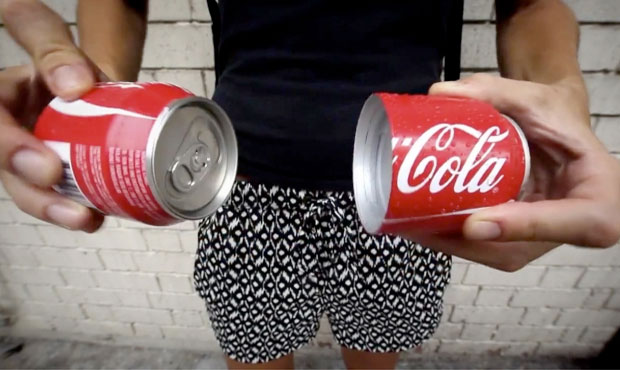
Commit to Delivering on Your Promise... or Commit to Fighting Relative Sameness
Last week I read an article about Coca-Cola’s new can that can be split in half so consumers can “share happiness.” Over the years, Coca-Cola has had big campaigns, all focused around its brand promise of fun, freedom and refreshment. Most don’t realize that Coca-Cola is the reason we think of Santa Claus as a jolly old man wearing a red outfit with rosy cheeks. He was jolly because he was drinking Coca-Cola. But those were all just campaigns. Coca-Cola’s latest campaign is “Share Happiness.” Its Happiness Truck was a nice promotional initiative to bring that idea to life, but it wasn’t completely focused on experiencing the product. Splitting the can in half, however, is the most literal delivery of its promise through the product itself. It’s so simple, but so brilliant.
Brands face this challenge: commit to delivering on a promise or commit to fighting relative sameness. In a previous post, I wrote that most companies compete in a world of relative sameness. This is as true in the consumer world as it is in the B2B world, which is why the promise your brand makes to its customers is so critical to success. It needs to be differentiated and it needs to be believable. But even more so, it can’t be delivered solely through an interesting campaign. Coke vs. Pepsi is an age-old debate. Pepsi just launched its new campaign, “Live for Now,” with its Pepsi Pulse site and a new commercial from Beyonce. Coca-Cola split their can in half!
Coca-Cola has demonstrated how the entire experience of the brand can, and should, deliver on its promise. This is especially important in the B2B space, as the experience goes far beyond just the product itself. Clearly, people need to know and believe that a product or service is going to deliver what it promises. But purchasing that product or service often requires consultation before the sale and training and support after it. From the initial contact with a customer to the sale itself to delivery, installation and support – the entire organization plays a role. But they don’t always think about it that way.
I always go back to IBM. They seem to continually get it right. Their entire business was structured around “eBusiness” in the 90s and early 2000s and “Smarter Planet” now. Back in 2008, their CEO outlined an agenda for building a “Smarter Planet.” And now everything they do supports that.
First and foremost, management needs to believe in the promise and understand why it’s important to the growth of their business. Each functional area within an organization then needs to understand their role in delivering the promise – from research & development to manufacturing to quality and regulatory to sales, distribution, technical support, customer service and so on. Everyone should understand what is required of them on a day-to-day basis and why it’s important.
When developed properly, a brand promise will not only help differentiate today, it will also provide the guidepost to the future. Providing focus for new features and releases, new delivery and/or service offerings, and new markets to go after. Otherwise, your brand will face a future of relative sameness.
It’s fairly simple: Make a promise. And make sure everyone is committed to delivering it. It’s as simple as splitting a can in half, right?
Archive
- April 2022 (1)
- February 2022 (1)
- January 2022 (1)
- December 2021 (1)
- October 2021 (1)
- June 2020 (1)
- July 2019 (1)
- April 2019 (1)
- March 2019 (1)
- February 2019 (2)
- December 2018 (1)
- July 2018 (1)
- April 2018 (7)
- August 2017 (1)
- July 2017 (2)
- January 2017 (1)
- December 2016 (1)
- August 2016 (1)
- October 2015 (1)
- September 2015 (1)
- June 2015 (2)
- May 2015 (1)
- February 2015 (2)
- December 2014 (1)
- November 2014 (1)
- October 2014 (1)
- April 2014 (4)
- February 2014 (1)
- December 2013 (1)
- October 2013 (2)
- September 2013 (1)
- July 2013 (2)
- June 2013 (1)
- April 2013 (2)
- March 2013 (2)
- February 2013 (1)
- January 2013 (1)
- December 2012 (1)
- October 2012 (2)


